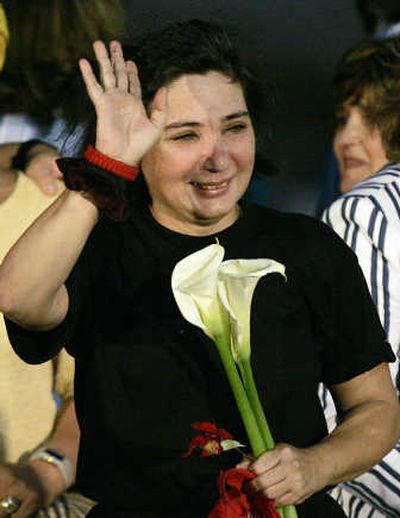Colombian hostages freed after six years in captivity

BOGOTA, Colombia – Ending six years of captivity at the hands of leftist rebels, four hostages in Colombia finally gained their freedom in a jungle clearing Wednesday after captors turned them over to representatives of Venezuelan President Hugo Chavez and the International Red Cross.
Dressed in T-shirts and jungle boots and appearing reasonably healthy, ex-legislators Gloria Polanco, Orlando Beltran, Luis Eladio Perez and Jorge Eduardo Gechem met a helicopter-borne delegation that included the Venezuelan interior minister and a Colombian senator
Venezuelan state television showed them as they were escorted to the meeting point in the Colombian jungle by a dozen guerrillas of the Revolutionary Armed Forces of Colombia, or FARC, wearing fatigues and carrying carbines. Planned for nearly a month, the release took place in the state of Guaviare, where on Jan. 10 the FARC released hostages Clara Rojas and Consuelo Gonzalez.
“Thanking you for bring me backing to life,” said a tearful Polanco, 47, as one of her rebel captors handed her several bunches of flowers. “I”ll leave one of these on the tomb of my husband and the others to my children. It’s all that I can bring them from the jungle.”
The four ex-legislators were then given medical exams and flown in helicopters to the Western Venezuelan army base of Santo Domingo. There they boarded a small jet and proceeded to Caracas’ Maiquetia airport where they were met by family members. Then they went to Miraflores presidential palace for a meeting with Chavez.
All four hostages have been held for six years or more since their kidnappings. The rebels are thought to be holding another 40 political prisoners they hope to exchange for rebels now held in government jails. Another 700 are being held for ransom, according to advocacy groups for victims and their families.
The FARC, Colombia’s largest rebel group, professes a communist ideology but supports its activities by drug trafficking and kidnapping, Colombian and U.S. government officials say. Founded in the mid-1960s, the group reached its apogee of power several years ago but has seen its ranks and territory shrink since President Alvaro Uribe took office in 2002.
Among those still being held are three U.S. defense contractor employees, Keith Stansell, Marc Goncalves and Thomas Howes, all imprisoned since their light aircraft was shot down in Colombia’s wild Caqueta state in February 2003.
Rumors of an alleged deal to secure the release of the Americans and of the other high-profile captive, former presidential candidate Ingrid Betancourt, have circulated for weeks. French President Nicolas Sarkozy has made the release of Bentancourt, who holds dual Colombian-French citizenship, a high priority.
But the FARC announced this week that there would be no more releases unless the Colombian government accedes to its demand that a demilitarized zone be created in central Colombia where all remaining hostages can be exchanged for hundreds of suspected rebels in government jails.
The Colombian president repeatedly has refused to agree to the demilitarized zone as a precondition of an exchange, saying a similar gesture by his predecessor led to no peace agreement.
But as he did last month, Uribe agreed to halt all military action in the area for several hours to facilitate the release. He also agreed to allow Chavez government officials to receive the hostages in Colombian territory, a precondition of the FARC who see Chavez as sympathetic to their cause and who are seeking to boost his humanitarian standing, political analysts have said.